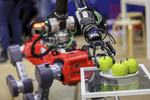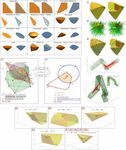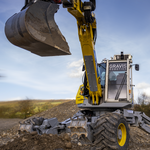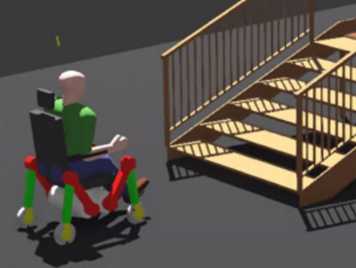Student Projects
Currently, the following student projects are available. Please contact the responsible supervisor and apply with your CV and transcripts.
In case you have project ideas related to any of these projects, take the opportunity and propose your own project!
We also offer Master Thesis and or exchange semesters at reknown universities around the world. Please contact us in case of interest!
Studies on Mechatronics
We offer students also to conduct their Studies on Mechatronics at our lab. In general, we recommend to do the Studies on Mechatronics in combination with the Bachelor Thesis, either as prepartory work the semester beofre or as extended study in parallel. If you want to do it independently, yiou can find prroposed projets also in the list below. Please directly apply with corresponsponding supervisor.
Online Safe Locomotion Learning in the Wild

Reinforcement learning (RL) can potentially solve complex problems in a purely data-driven manner. Still, the state-of-the-art in applying RL in robotics, relies heavily on high-fidelity simulators. While learning in simulation allows to circumvent sample complexity challenges that are common in model-free RL, even slight distribution shift ("sim-to-real gap") between simulation and the real system can cause these algorithms to easily fail. Recent advances in model-based reinforcement learning have led to superior sample efficiency, enabling online learning without a simulator. Nonetheless, learning online cannot cause any damage and should adhere to safety requirements (for obvious reasons). The proposed project aims to demonstrate how existing safe model-based RL methods can be used to solve the foregoing challenges.
Keywords
safe mode-base RL, online learning, legged robotics
Labels
Master Thesis
Description
Contact Details
More information
Open this project... call_made
Published since: 2024-05-03
Organization ETH Competence Center - ETH AI Center
Hosts Li Chenhao , Li Chenhao , Li Chenhao , Li Chenhao
Topics Engineering and Technology
Learning Robust Perceptive Locomotion for Humanoid Robots Over Challenging Terrains

Quadrupedal robots have demonstrated a great potential to play a significant role in various applications [1, 2], including operating autonomously in remote and hazardous environments, industrial surveillance, etc. Their kinematic structure, similar to that of quadrupedal animals, makes them highly adaptable to both natural landscapes and human-made environments. Over the past decade, significant progress has been made in developing robust quadrupedal locomotion. However, achieving successful bipedal locomotion remains a greater challenge. Humanoids exhibit more intricate dynamic and kinematic properties, including a smaller base of support, more DoFs, potential self collisions from arm swing, etc. In this project, based on the gaited network structure proposed in [2] for quadrupedal robots, we aim at adapting this approach to bipedal locomotion in simulation and on the real machine.
Keywords
Reinforcement Learning, Humanoid, Locomotion
Labels
Master Thesis , ETH Zurich (ETHZ)
PLEASE LOG IN TO SEE DESCRIPTION
More information
Open this project... call_made
Published since: 2024-04-30
Organization Robotic Systems Lab
Hosts He Junzhe
Topics Information, Computing and Communication Sciences , Engineering and Technology
Task Planning with Pre-trained Foundation Models for Legged Mobile Manipulators

Imagine this scenario: you return home after a tiring day at work. Instead of reaching for a drink yourself, you simply instruct your home robot, perhaps with a casual "Fetch me a cold drink" or even a specific request like "Could you mix me a gin and tonic?". The robot then undertakes a series of actions, such as navigating to the fridge, opening it, identifying a cold beverage, and bringing it back to you. Such a seemingly intricate task might have once been confined to the realm of science fiction. However, thanks to the rise of powerful foundation models, this futuristic vision is gradually turning into reality. Currently, experts in robotics painstakingly design numerous behaviors to accomplish a limited range of tasks. Furthermore, operators require extensive training to navigate these intricate systems. With the rise of foundation models capable of perception and reasoning, robots can now understand human instructions across languages, comprehend complex environments, and plan extended sequences of actions, such as preparing a cup of coffee. We find ourselves at a crucial juncture where general-purpose robots are finally within reach. In this project, we seek to advance the field of mobile manipulation using these powerful pretrained foundation models. In particular, we’ll exploit knowledge embedded in VLMs and LLMs to allow the robot to better interpret a task given by a human and develop an understanding of how to achieve and verify the completion of this task.
Keywords
Zero-shot task planning, mobile manipulation
Labels
Semester Project , Master Thesis
PLEASE LOG IN TO SEE DESCRIPTION
More information
Open this project... call_made
Published since: 2024-04-29 , Earliest start: 2024-05-01
Organization Robotic Systems Lab
Hosts Qu Kaixian , Zurbrügg René , Cramariuc Andrei
Topics Engineering and Technology
Mid-Range Path Planning Integrating Vision with LLM and Depth Sensing

This project aims to advance the field of robotic navigation by focusing on mid-range path planning, a crucial layer that connects the overarching routes designed by global planning and the immediate, reactive maneuvers of local planning. The project will develop a neural network model capable of generating a sequence of waypoints toward a specified 3D goal position by leveraging current RGB images, GPT cost reasoning from large language model (LLM) , and estimated depth images. This integration will facilitate more efficient navigation through complex environments by smoothing transitions between planning layers and optimizing route adjustments in real-time.
Keywords
Robot Planning; Vision Learning; LLM (Vision GPT) Reason,
Labels
Semester Project , Bachelor Thesis , Master Thesis
PLEASE LOG IN TO SEE DESCRIPTION
More information
Open this project... call_made
Published since: 2024-04-26 , Earliest start: 2024-05-01 , Latest end: 2025-01-01
Organization Robotic Systems Lab
Hosts Yang Fan
Topics Information, Computing and Communication Sciences
Image Based Robust Pose Estimation for General Excavator Buckets

The efficient operation of excavators in construction environments necessitates precise pose estimation of their buckets. Current methods rely on IMUs placed on the excavator arm which require tedious calibration and can be damaged during construction operations. This project aims to leverage computer vision and machine learning to enhance pose estimation, thereby enabling VR overlays for teleoperation and facilitating automation tasks.
Keywords
Computer Vision, Machine Learning, Synthetic Images, Excavators, Construction, 3D Pose Estimation
Labels
Semester Project , Master Thesis
Description
Work Packages
Requirements
Contact Details
More information
Open this project... call_made
Published since: 2024-04-16 , Earliest start: 2024-04-01
Organization Robotic Systems Lab
Hosts Schorp Vincent , Terenzi Lorenzo
Topics Information, Computing and Communication Sciences
Learning Pose Estimation for Partially Occluded Objects from Simulation

This project addresses the task of 6D pose estimation for general-purpose objects, particularly when dealing with occlusion. We aim to leverage recent deep learning methods and synthetic data generation schemes to enable robust object manipulation.
Keywords
Object Pose Estimation, Perceptive Manipulation, Photorealistic Simulation
Labels
Semester Project , Master Thesis
Description
Work Packages
Requirements
Contact Details
More information
Open this project... call_made
Published since: 2024-04-03
Applications limited to ETH Zurich , EPFL - Ecole Polytechnique Fédérale de Lausanne
Organization Robotic Systems Lab
Hosts Zurbrügg René , Bhardwaj Arjun , Patil Vaishakh
Topics Information, Computing and Communication Sciences
Lifelike Agility on ANYmal by Learning from Animals

The remarkable agility of animals, characterized by their rapid, fluid movements and precise interaction with their environment, serves as an inspiration for advancements in legged robotics. Recent progress in the field has underscored the potential of learning-based methods for robot control. These methods streamline the development process by optimizing control mechanisms directly from sensory inputs to actuator outputs, often employing deep reinforcement learning (RL) algorithms. By training in simulated environments, these algorithms can develop locomotion skills that are subsequently transferred to physical robots. Although this approach has led to significant achievements in achieving robust locomotion, mimicking the wide range of agile capabilities observed in animals remains a significant challenge. Traditionally, manually crafted controllers have succeeded in replicating complex behaviors, but their development is labor-intensive and demands a high level of expertise in each specific skill. Reinforcement learning offers a promising alternative by potentially reducing the manual labor involved in controller development. However, crafting learning objectives that lead to the desired behaviors in robots also requires considerable expertise, specific to each skill.
Keywords
learning from demonstrations, imitation learning, reinforcement learning
Labels
Master Thesis
Description
Contact Details
More information
Open this project... call_made
Published since: 2024-03-25
Organization ETH Competence Center - ETH AI Center
Hosts Li Chenhao , Li Chenhao , Klemm Victor
Topics Information, Computing and Communication Sciences
Learning Real-time Human Motion Tracking on a Humanoid Robot

Humanoid robots, designed to mimic the structure and behavior of humans, have seen significant advancements in kinematics, dynamics, and control systems. Teleoperation of humanoid robots involves complex control strategies to manage bipedal locomotion, balance, and interaction with environments. Research in this area has focused on developing robots that can perform tasks in environments designed for humans, from simple object manipulation to navigating complex terrains. Reinforcement learning has emerged as a powerful method for enabling robots to learn from interactions with their environment, improving their performance over time without explicit programming for every possible scenario. In the context of humanoid robotics and teleoperation, RL can be used to optimize control policies, adapt to new tasks, and improve the efficiency and safety of human-robot interactions. Key challenges include the high dimensionality of the action space, the need for safe exploration, and the transfer of learned skills across different tasks and environments. Integrating human motion tracking with reinforcement learning on humanoid robots represents a cutting-edge area of research. This approach involves using human motion data as input to train RL models, enabling the robot to learn more natural and human-like movements. The goal is to develop systems that can not only replicate human actions in real-time but also adapt and improve their responses over time through learning. Challenges in this area include ensuring real-time performance, dealing with the variability of human motion, and maintaining stability and safety of the humanoid robot.
Keywords
real-time, humanoid, reinforcement learning, representation learning
Labels
Master Thesis
Description
Contact Details
More information
Open this project... call_made
Published since: 2024-03-25
Organization ETH Competence Center - ETH AI Center
Hosts He Junzhe , Li Chenhao , Li Chenhao
Topics Information, Computing and Communication Sciences
Continuous Skill Learning with Fourier Latent Dynamics

In recent years, advancements in reinforcement learning have achieved remarkable success in teaching robots discrete motor skills. However, this process often involves intricate reward structuring and extensive hyperparameter adjustments for each new skill, making it a time-consuming and complex endeavor. This project proposes the development of a skill generator operating within a continuous latent space. This innovative approach contrasts with the discrete skill learning methods currently prevalent in the field. By leveraging a continuous latent space, the skill generator aims to produce a diverse range of skills without the need for individualized reward designs and hyperparameter configurations for each skill. This method not only simplifies the skill generation process but also promises to enhance the adaptability and efficiency of skill learning in robotics.
Keywords
representation learning, periodic autoencoders, learning from demonstrations, policy modulating trajectory generators
Labels
Master Thesis
Description
Contact Details
More information
Open this project... call_made
Published since: 2024-03-25
Organization ETH Competence Center - ETH AI Center
Hosts Li Chenhao , Rudin Nikita
Topics Information, Computing and Communication Sciences , Engineering and Technology
Universal Humanoid Motion Representations for Expressive Learning-based Control

Recent advances in physically simulated humanoids have broadened their application spectrum, including animation, gaming, augmented and virtual reality (AR/VR), and robotics, showcasing significant enhancements in both performance and practicality. With the advent of motion capture (MoCap) technology and reinforcement learning (RL) techniques, these simulated humanoids are capable of replicating extensive human motion datasets, executing complex animations, and following intricate motion patterns using minimal sensor input. Nevertheless, generating such detailed and naturalistic motions requires meticulous motion data curation and the development of new physics-based policies from the ground up—a process that is not only labor-intensive but also fraught with challenges related to reward system design, dataset curation, and the learning algorithm, which can result in unnatural motions. To circumvent these challenges, researchers have explored the use of latent spaces or skill embeddings derived from pre-trained motion controllers, facilitating their application in hierarchical RL frameworks. This method involves training a low-level policy to generate a representation space from tasks like motion imitation or adversarial learning, which a high-level policy can then navigate to produce latent codes that represent specific motor actions. This approach promotes the reuse of learned motor skills and efficient action space sampling. However, the effectiveness of this strategy is often limited by the scope of the latent space, which is traditionally based on specialized and relatively narrow motion datasets, thus limiting the range of achievable behaviors. An alternative strategy involves employing a low-level controller as a motion imitator, using full-body kinematic motions as high-level control signals. This method is particularly prevalent in motion tracking applications, where supervised learning techniques are applied to paired input data, such as video and kinematic data. For generative tasks without paired data, RL becomes necessary, although kinematic motion presents challenges as a sampling space due to its high dimensionality and the absence of physical constraints. This necessitates the use of kinematic motion latent spaces for generative tasks and highlights the limitations of using purely kinematic signals for tasks requiring interaction with the environment or other agents, where understanding of interaction dynamics is crucial. We would like to extend the idea of creating a low-level controller as a motion imitator to full-body motions from real-time expressive kinematic targets.
Keywords
representation learning, periodic autoencoders
Labels
Master Thesis
Description
Contact Details
More information
Open this project... call_made
Published since: 2024-03-25
Organization ETH Competence Center - ETH AI Center
Hosts Li Chenhao , Li Chenhao , Li Chenhao
Topics Information, Computing and Communication Sciences , Engineering and Technology
Humanoid Locomotion Learning and Finetuning from Human Feedback

In the burgeoning field of deep reinforcement learning (RL), agents autonomously develop complex behaviors through a process of trial and error. Yet, the application of RL across various domains faces notable hurdles, particularly in devising appropriate reward functions. Traditional approaches often resort to sparse rewards for simplicity, though these prove inadequate for training efficient agents. Consequently, real-world applications may necessitate elaborate setups, such as employing accelerometers for door interaction detection, thermal imaging for action recognition, or motion capture systems for precise object tracking. Despite these advanced solutions, crafting an ideal reward function remains challenging due to the propensity of RL algorithms to exploit the reward system in unforeseen ways. Agents might fulfill objectives in unexpected manners, highlighting the complexity of encoding desired behaviors, like adherence to social norms, into a reward function. An alternative strategy, imitation learning, circumvents the intricacies of reward engineering by having the agent learn through the emulation of expert behavior. However, acquiring a sufficient number of high-quality demonstrations for this purpose is often impractically costly. Humans, in contrast, learn with remarkable autonomy, benefiting from intermittent guidance from educators who provide tailored feedback based on the learner's progress. This interactive learning model holds promise for artificial agents, offering a customized learning trajectory that mitigates reward exploitation without extensive reward function engineering. The challenge lies in ensuring the feedback process is both manageable for humans and rich enough to be effective. Despite its potential, the implementation of human-in-the-loop (HiL) RL remains limited in practice. Our research endeavors to significantly lessen the human labor involved in HiL learning, leveraging both unsupervised pre-training and preference-based learning to enhance agent development with minimal human intervention.
Keywords
reinforcement learning from human feedback, preference learning
Labels
Master Thesis
Description
Goal
Contact Details
More information
Open this project... call_made
Published since: 2024-03-25
Organization ETH Competence Center - ETH AI Center
Hosts Li Chenhao , Li Chenhao , Chen Xin , Li Chenhao
Topics Information, Computing and Communication Sciences , Engineering and Technology
Using LLMs to adjust to human preferences during human-robot collaboration

We want to exploit LLMs to adjust to human preferences while interacting. We think that we can generate desired behaviors by leveraging LLMs to translate the natural language to robot motion, e.g. "move faster, lift higher, come closer". We aim to carry out tests in a robot-human handover scenario.
Keywords
LLMs, deep learning, human-robot interaction, legged robots
Labels
Master Thesis
PLEASE LOG IN TO SEE DESCRIPTION
More information
Open this project... call_made
Published since: 2024-03-14
Organization Robotic Systems Lab
Hosts Zurbrügg René , Tulbure Andreea
Topics Information, Computing and Communication Sciences , Behavioural and Cognitive Sciences
Deploying Locomotion Policies Trained in Differentiable Simulation on Real Hardware

In recent years, using deep Reinforcement Learning (RL) for robotic motion policies has demonstrated impressive performance, yielding unprecedented robustness on real hardware. Current sim2real approaches rely on large-scale pre-training with domain randomization to make policies robust but struggle with high-dimensional spaces. Current RL methods are primarily limited by their low sample efficiency. Leveraging differentiable simulators for first-order gradient information shows great results for enhancing sample efficiency. Although promising simulation results exist, deployment on hardware is not usually done. The goal of this thesis is to train quadrupedal locomotion policies in a differentiable simulation framework, and then enable real-world deployment by modifying the simulation, the policy training, or the learning algorithm. Ideally, we can leverage properties of differentiable simulators in this process to improve sim2real transfer by fitting real data.
Keywords
Deep Reinforcement Learning, Differentiable Simulation, Quadrupedal Locomotion Control, Sim2Real
Labels
Semester Project , Master Thesis
Description
Work Packages
Requirements
Contact Details
More information
Open this project... call_made
Published since: 2024-03-11
Organization Robotic Systems Lab
Hosts Klemm Victor
Topics Information, Computing and Communication Sciences , Engineering and Technology
Towards AI Safety: Adversarial Attack & Defense on Neural Controllers

The project is collaborating between SRI and RSL/CRL lab and aims to investigate the weakness of the neural controller based on the state-of-the-art [3] attacking method.
Keywords
Adversarial attack; safe AI; Reinforcement learning
Labels
Semester Project , Master Thesis
PLEASE LOG IN TO SEE DESCRIPTION
More information
Open this project... call_made
Published since: 2024-03-06 , Earliest start: 2024-03-06 , Latest end: 2024-09-30
Applications limited to ETH Zurich , EPFL - Ecole Polytechnique Fédérale de Lausanne
Organization Robotic Systems Lab
Hosts Shi Fan , Shi Fan , Shi Fan
Topics Information, Computing and Communication Sciences , Engineering and Technology
Learning Diverse Adversaries to Black-box Learning-based Controller for Quadruped Robots

The project aims to leverage the latest unsupervised skill discovery techniques to validate the state-of-the-art black-box learning-based controllers in diverse ways.
Keywords
Diversity in RL, Trustworthy AI
Labels
Semester Project , Master Thesis
PLEASE LOG IN TO SEE DESCRIPTION
More information
Open this project... call_made
Published since: 2024-03-02 , Earliest start: 2024-03-02 , Latest end: 2024-08-28
Applications limited to ETH Zurich , [nothing]
Organization Robotic Systems Lab
Hosts Shi Fan , Shi Fan , Shi Fan
Topics Information, Computing and Communication Sciences
Towards interpretable learning pipeline: A visual-assisted workflow for locomotion learning

Current reinforcement learning (RL)-based locomotion controllers have shown promising performance. However we are still not clear about what is learned during the training process. In this project, we investigate the proper metrics and visualisation techniques to interactively steer the locomotion learning tasks.
Keywords
Reinforcement learning; visualization; interpretable AI
Labels
Semester Project , Master Thesis
PLEASE LOG IN TO SEE DESCRIPTION
More information
Open this project... call_made
Published since: 2024-02-28 , Earliest start: 2024-02-26 , Latest end: 2024-08-26
Organization ETH Competence Center - ETH AI Center
Hosts Zhang Xiaoyu , Shi Fan , Wang April , Shi Fan , Shi Fan
Topics Engineering and Technology
End-to-end Leaning Terrain Cost with Robot Kinematic Constraints

Navigating the unpredictable off-road environment, autonomous robots require a tailored approach to overcome obstacles and optimize pathfinding. Our proposed terrain cost mapping system goes beyond traditional processing by factoring in each robot's specific kinematic abilities. We introduce a novel simulation-based Roll-Out technique to predict a robot's stability over varied terrains, thereby calculating a precise terrain cost. This innovative strategy promises to enhance autonomous navigation by ensuring safe and efficient traversal tailored to individual robotic capabilities.
Keywords
Leaning Terrain Cost; Off-road Navigation; Robot Kinematics
Labels
Semester Project , Master Thesis
Description
Work Packages
Requirements
Contact Details
More information
Open this project... call_made
Published since: 2024-02-21 , Earliest start: 2023-11-30 , Latest end: 2024-01-31
Organization Robotic Systems Lab
Hosts Yang Fan
Topics Information, Computing and Communication Sciences
Imposition of non-fixed convex constraints on Neural Networks

This project aims to answer the unsolved question of how to guarantee (in a computationally efficient way) hard convex constraints on the output of a network when the parameters that define the constraints change.
Keywords
Neural networks, convex, constraints, hard, optimization
Labels
Semester Project , Collaboration , Master Thesis
Description
Work Packages
Requirements
Contact Details
More information
Open this project... call_made
Published since: 2024-02-13 , Earliest start: 2024-02-13 , Latest end: 2025-03-29
Organization Robotic Systems Lab
Hosts Tordesillas Jesus
Topics Mathematical Sciences , Information, Computing and Communication Sciences
Acrobatics excavator maneuver

We want to achieve advanced maneuvering capabilities in a tracked excavator. The project focuses on repositioning the excavator efficiently in tight spaces. It focuses on efficient repositioning in tight spaces by pivoting and lifting one side using the bucket The practical aspect of the project involves integrating and testing the solution on a full-size CAT 323 excavator, weighing 25 tons.
Keywords
Robotic acrobatic maneuver, planning algorithms
Labels
Master Thesis
PLEASE LOG IN TO SEE DESCRIPTION
More information
Open this project... call_made
Published since: 2023-12-06 , Earliest start: 2024-02-29 , Latest end: 2025-04-30
Organization Robotic Systems Lab
Hosts Zhang Weixuan
Topics Information, Computing and Communication Sciences , Engineering and Technology
Anomaly Detection in Excavation Using Machine Learning

This project aims to develop an algorithm for detecting anomalies during autonomous excavation. The goal is to enable these machines to identify obstacles like rocks, buried cables, or pipes to prevent damage or delays. Key challenges include creating realistic simulations and achieving a low false positive rate in various soil environments. The project will involve both simulation and hardware testing on full-sized excavators.
Keywords
Machine learning, sim-to-real, tactile sensing, autonomous robots, autonomous excavator
Labels
Semester Project , Master Thesis
PLEASE LOG IN TO SEE DESCRIPTION
More information
Open this project... call_made
Published since: 2023-12-06 , Earliest start: 2024-02-29 , Latest end: 2024-06-30
Organization Robotic Systems Lab
Hosts Zhang Weixuan
Topics Information, Computing and Communication Sciences , Engineering and Technology
Student Theses in Industry
We have a large number of industry partners who search for excellent students to conduct their student theses at the company or at ETH but in close collaboration with them (joint supervision by industry and ETH).
Ammann Group (Switzerland)
The Ammann Group is a worldwide leader in the manufacture of mixing plants, machinery, and services in the construction industry, with core competence in road construction and landscaping as well as in the transport infrastructure.
We are collaborating with Ammann to automate construction equipment
Maxon (Switzerland)
Maxon develops and builds electric drive systems that are among the best in the world. Their drive systems can be found wherever extreme precision and the highest quality standards are indispensable – on Earth, and on Mars.
Shunk (Germany)
Legged Wheel Chair

This project aims at extending a dynamic simulation and locomotion controllers for a robotized wheelchair able to handle difficult terrains including stairs. This project will prepare the prototype phase coming next.
.
Note on plagiarism
We would like to suggest every student, irrespective of the type of project (Bachelor, Semester, Master, ...), to make himself/herself familiar with ETH rules regarding plagiarism
